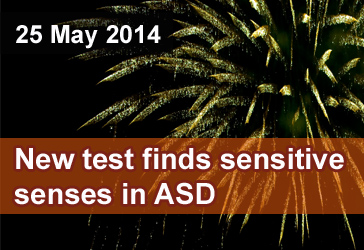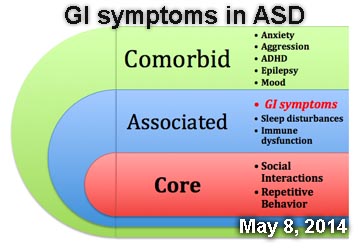Archives
May, 2014
Select a different month in the archive
Researchers Report Promising New Sensory Test For ASD
By Shana R. Spindler, Ph.D. on May 25, 2014

Background: The new edition of the Diagnostic and Statistical Manual of Mental Disorders (DSM-5) includes sensory sensitivity as a core feature of Autism Spectrum Disorder (ASD). Those with ASD may be extra responsive to changes in temperature, loud noises, strong smells and tastes, or even bright colors. Most sensory questionnaires targeted to individuals with autism are parental reports. Few sensory questionnaires exist for self-reporting by adults with ASD.
What’s new: A new questionnaire, called the Sensory Perception Quotient (SPQ), can reliably measure sensory sensitivity in adults with and without ASD, according to a new study published in Molecular Autism. The SPQ contains statements meant to identify a person’s sensitivity to surrounding sensory inputs, such as “I would be able to detect if a strawberry was ripe by smell alone,” or “I can hear electricity humming in the walls.” The test taker then agrees or disagrees with the statement on a scale of 0 (strongly agrees) to 3 (strongly disagrees). After giving the SPQ to 196 adults with ASD and 163 control participants, the researchers verified that adults with ASD are significantly more sensitive than controls to sight, sound, touch, and taste, but not smell.
Why it’s important: Previous sensory tests for adults assessed behavioral response to the environment rather than focusing on how intensely a person senses surrounding stimuli. While additional research is needed to determine if results from the SPQ match laboratory-measured sensitivity, the SPQ is a promising new tool for identify the sensory needs of individuals in the autism community.
Help me understand :
| Source(s) : |
| Tweet |
Researchers Explore ASD and GI Symptoms Link
By Chelsea E. Toledo, M.A. on May 8, 2014

Background: For over thirty years, researchers have suspected a link between Autism Spectrum Disorder (ASD) and gastrointestinal (GI) symptoms. The GI symptoms frequently reported in ASD include abdominal pain, constipation, chronic diarrhea, and gastroesophageal reflux disease. Recently, The National Institutes of Health has prioritized research exploring GI symptoms in people with ASD.
What’s new: On May 2, 2014, the journal Pediatrics published a meta-analysis of GI symptoms in ASD, examining 15 studies conducted between 1980 and 2012. In all, the analysis included data from 2215 children with ASD, whose GI indicators were compared to those in children without ASD. The researchers found that, when all studies were taken into consideration, children with ASD were much more likely than their typically developing counterparts to experience general GI symptoms—as well as specific symptoms such as diarrhea, constipation, and abdominal pain.
Why it’s important: This study is the first thorough evaluation of the evidence suggesting that GI dysfunction is more common in children with ASD. More research is needed to determine why GI symptoms appear more common in people with ASD, as well as their long-term effects.
Help me understand :
| Source(s) : |
| Tweet |

